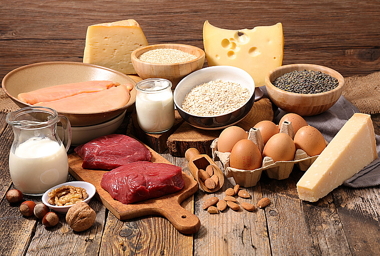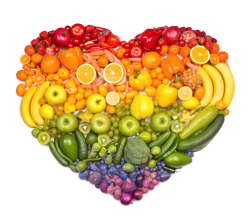Vitamin B2 or Riboflavin is a water-soluble vitamin that helps convert food into energy. It is known as the fat burner vitamin, as you cannot properly process your fats without it.
Food Acupuncture: Vitamins & Minerals
Small but significant: Tiny amounts big results Structuring/building/connecting/energizing/repairing/healing…
The power of vitamins comes from the power of real food
Vitamin B2 is water soluble
This is particularly important for those who wish to lose a little bit of extra fat from their body, or simply be able to efficiently burn the fat in their food.
Sources of vitamin B2
Riboflavin is found in a number of both plant and animal based foods, including green vegetables, nuts, yeast, dairy products, fish and meats. Particularly B2-rich are spinach, broccoli and asparagus, almonds and salmon. Good sources of the vitamin are also whole and enriched foods, such as fortified cereals and breads.


Note that riboflavin is easily destroyed upon exposure to light. For instance, up to 50% of the riboflavin in milk contained in a clear glass bottle can be destroyed after two hours of exposure to bright sunlight.
Functions:
Riboflavin is one of the naturally occurring flavins. Flavins play a critical role in numerous biochemical reactions, and in the body, riboflavin is an integral part of the important coenzymes. These enzymes are involved in multiple cellular metabolic activities necessary for normal cell growth, as well as enabling the proper development of the body, such as the skin, hair, the lining of the digestive tract, blood cells, and brain function.
Absorption:
Dietary flavins are released from their protein-bound state via gastric acid and enzymes. Riboflavin is absorbed across the intestinal mucosa, and following absorption it eventually reaches the liver. Blood riboflavin concentrations reflect recent dietary intake.
![]()
Vitamin B2 deficiency:
Most of the population in the Western world gets enough of this nutrient, and clinical deficiency is rare; however, riboflavin deficiency is more common than generally appreciated. There is evidence suggesting that suboptimal riboflavin status may be a widespread problem affecting an otherwise healthy population in the developed world. For example, a high proportion of the British adult population was reported to have poor riboflavin status.
A study of independently living people between 65 and 95 years of age found that almost 25% consumed less than the recommended riboflavin intake, and 10% showed a deficiency. Additionally, older people who had suffered strokes were found to be deficient in riboflavin.
Furthermore, pure deficiency in riboflavin is rarely found in isolation: it occurs frequently in combination with deficiencies in other water-soluble vitamins!
Alcoholics are at increased risk of riboflavin deficiency due to decreased intake, absorption, and impaired utilisation of riboflavin. Interestingly, however, the elevated homocysteine levels (a blood chemical, of which high levels are associated with heart disease) associated with riboflavin deficiency rapidly decline during alcohol withdrawal.
Other at-risk groups are anorexic individuals as they rarely consume adequate riboflavin, lactose intolerant individuals as dairy products are good sources of riboflavin, patients with malabsorption syndromes, e.g. active celiac disease, and those using phenobarbital and other barbiturates over a long period of time.
Clinical signs of riboflavin deficiency include sore throat, redness and swelling of the lining of the mouth and throat, cracks or sores on the lips and at the corners of the mouth, inflammation and redness of the tongue, and a moist scaly skin inflammation. Other symptoms may involve the formation of blood vessels in the eye and decreased red blood cell count (anaemia). Severe riboflavin deficiency may result in decreased conversion of vitamin B6 to its coenzyme form and decreased conversion of tryptophan to niacin (vitamin B3).
Supplements:
An oral supplement of riboflavin can increase the levels of this vitamin in the body, and riboflavin is frequently used in combination with other B-vitamins in vitamin B complex products.
Toxicity:
No adverse effects have been reported after ingestion of high doses of riboflavin, because excessive amounts of riboflavin are usually not absorbed. Riboflavin is likely safe for most people when taken orally, but it may cause diarrhoea or turn the urine to a yellow-orange colour in some people.
Note of caution
Taking riboflavin along with tetracyclines might decrease the medicinal effectiveness by decreasing the amount of tetracyclines that the body can absorb. To avoid this interaction, riboflavin should be taken two hours before or four hours after taking tetracyclines.
Return to the list of B vitamins.



